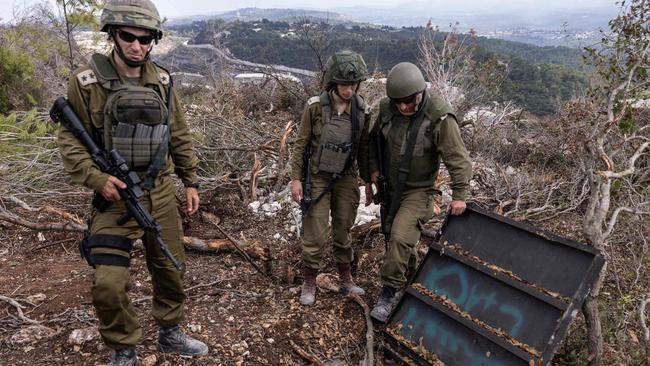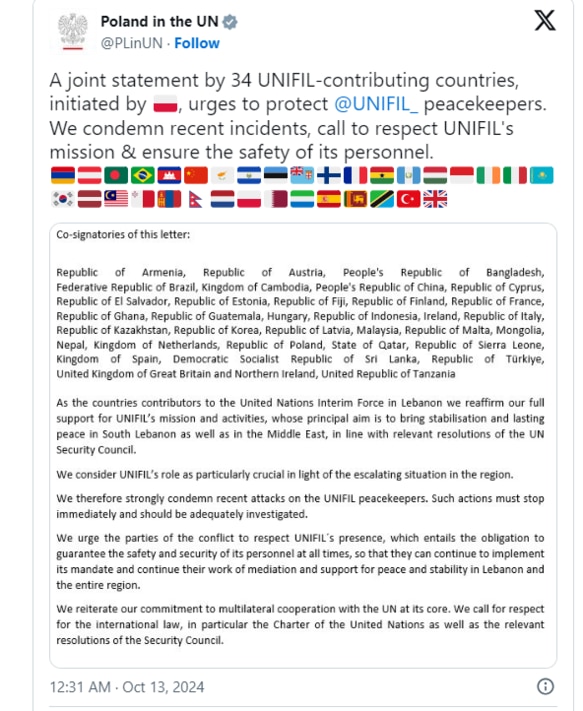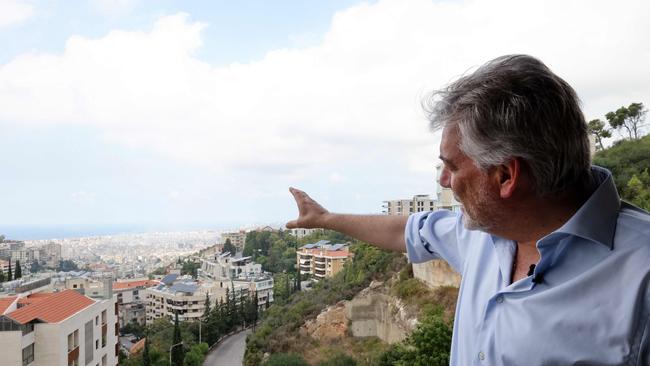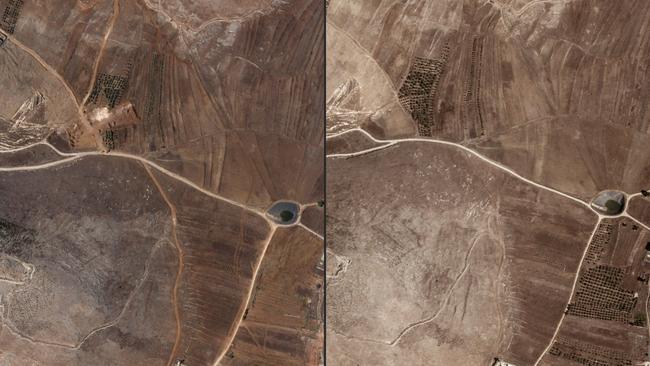Hezbollah tunnels ‘built near UN peacekeepers’: IDF
The Israeli military claims Hezbollah built tunnels around UN structures in Lebanon, as the IDF is accused of ‘deliberately’ firing on peacekeepers.

On a forested mountainside near the border between Israel and Lebanon, two tunnel shafts descend dozens of feet into the rocky earth.
Around 300 feet away, the blue United Nations flag waved atop a peacekeeping observation post.
The Israeli military took a group of reporters into Lebanon on Sunday to see the shafts, which it said were among hundreds of tunnel entrances and underground bunkers used by Hezbollah militants to store weapons and hide fighters west of the Lebanese village of Labbouneh.
Israel has faced criticism from the U.N. and European capitals for injuries to peacekeepers as Israeli forces engage in a ground offensive against Hezbollah. U.N. personnel have been wounded and compounds have been damaged, according to the U.N.
Israeli officers said the presence of the tunnels was evidence that Hezbollah had built military infrastructure around U.N. and civilian settlements, using them as cover. They also said that the U.N. peacekeepers, who are supposed to monitor and prevent militant activities along the border, weren’t doing their job.
Israeli Prime Minister Benjamin Netanyahu on Sunday urged U.N. Secretary-General António Guterres to remove peacekeepers of the U.N. Interim Force in Lebanon from the area, saying they risked being caught in the crossfire between Israeli forces and Hezbollah fighters.
Hezbollah didn’t immediately respond to a request for comment on the tunnel shafts and the allegations that it places itself near U.N. positions.
Unifil has said it doesn’t intend to leave its positions to fulfil its mandate from the U.N. Security Council.
Israeli officers told reporters that international peacekeepers based at the U.N. site should have heard or seen Hezbollah drilling into the mountainside to dig the tunnels. The officers didn’t specify where the tunnels originated.
U

nifil doesn’t have sophisticated detection equipment such as thermal imaging sensors or radars to detect underground activity, spokesman Andra Tenenti said. He said that peacekeepers report all tunnels and weapons they see and report all discoveries quarterly to the U.N. Security Council.
“We report all violations. If we had seen a tunnel, we would have reported it,” he said, adding that he couldn’t say whether the U.N. force was aware of the tunnels found by the Israeli military.
Jean-Pierre Lacroix, the U.N.’s head of peacekeeping, said last week that the U.N. force had highlighted concerns about Hezbollah stationing its forces near U.N. positions and potentially drawing fire from Israel. Now, he said, Israeli forces are doing the same.
Lacroix said that U.N. forces remained in the area but that 300 staff have been moved to larger bases or taken other precautions.
Israeli forces fighting Palestinian Islamist militant group Hamas have discovered numerous Hamas tunnels under and around U.N. installations in the Palestinian enclave as well as in and around hospitals and other civilian infrastructure.
The Israeli military’s revelations on the Hezbollah tunnel – near the border with Israel – comes amid worsening tension between Israel and the U.N. as Israel’s fight against militants on its borders has intensified in the months after a Hamas-led attack on Oct. 7 last year killed 1,200 people in Israel.
Unifil said on Sunday that at least 15 peacekeepers suffered skin irritation and gastrointestinal problems after Israeli tanks breached a U.N. position’s main gate, firing several rounds nearby that emitted smoke.
The U.N. earlier said that Israeli forces had injured two peacekeepers. Three others were also hurt, but it was unclear whether the casualties were caused by Israeli or Hezbollah fire. An Israeli military official said at least one of the injuries was due to Hezbollah.
The Israeli military said the tank had backed into the Unifil position while fleeing from a large barrage of antitank missiles from Hezbollah that injured 25 soldiers in varying degrees. The tank was trying to help the evacuation of the soldiers and a smokescreen was used in those efforts, the military said.
In recent weeks, a military spokesman said, there were a few dozen incidents where missiles and rockets were launched at soldiers and Israeli communities from locations close to Unifil posts in southern Lebanon. One of these attacks killed two soldiers on Sunday, the military spokesman said.
Unifil was established in 1978 following a previous Israeli invasion of Lebanon. It has 10,000 peacekeepers from dozens of countries, including France, Germany, and Italy.
Richard Gowan, an expert on the U.N. for the International Crisis Group, a Brussels-based think tank, said that Unifil doesn’t have the authority or capacity to take on Hezbollah but is authorised to assist the Lebanese army in securing the border area.

“The troop contributors would argue that the U.N. presence has at least created some day-to-day obstacles to Hezbollah’s operations, and 10 to 15 years ago I think the IDF would have grudgingly acknowledged that claim, but it no longer believes it,” said Gowan.
In the area west of Labbouneh, many trees and bushes had been uprooted. Inside the tunnel shafts shown to journalists, which were too deep to see the bottom, Israeli soldiers said they found communications and surveillance equipment. The shafts are deep enough to protect Hezbollah’s fighters from Israel’s air force, they said.

The military said it discovered the extensive underground network along the western border in the past week. Some of the shafts are connected in clusters but it isn’t clear yet whether the entire underground network is linked, Israeli officials said.
Israel’s military said it had found rifles and antitank missiles, uniforms and combat vests, medicine, blood, anaesthesia, water and internet cables in the tunnels. The military said it believed the underground fortifications were prepared to be used as a staging ground for an invasion on northern Israel.
Labbouneh sits near Israel’s border, and a Wall Street Journal reporter could see directly into the Israeli town of Rosh Hanikra, which abuts the Mediterranean Sea.
“We need to make sure that no terror group will encroach on our border. This shows we need a new solution because the current one isn’t working, ” said an Israeli officer accompanying the journalists, who said he lived in an Israeli town located just across the border. “Hezbollah could shoot an antitank missile through my window from here.”
Dow Jones



To join the conversation, please log in. Don't have an account? Register
Join the conversation, you are commenting as Logout